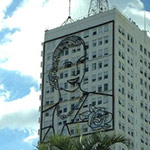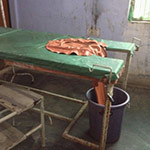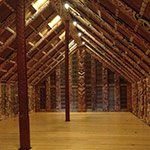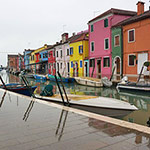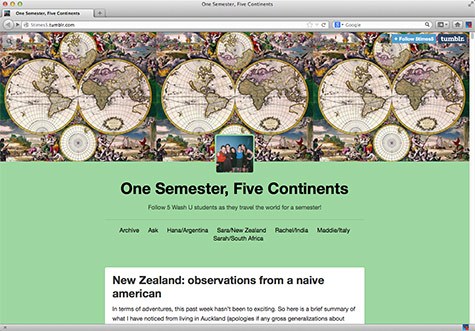
WUSTL juniors Sarah Hull, Hana Hartman, Rachel Hirsch, Sara Fletcher and Madeline Wells share a passion for travel and potluck. During one of their regular dinners, the five friends realized each would be spending the spring semester on a different continent. They decided to chronicle their adventures in the shared blog, 5times5.

Sarah Hull, an art and psychology student, is enrolled at University of Cape Town in South Africa. Sarah got a glimpse of Cape Town’s penguin colony.

Hana Hartman, an anthropology and women, gender and sexuality studies student, is in Buenos Aires as part of the SIT Argentina: Social Movements and Human Rights program. Hana met a baby duckling at an estancia, a ranch outside Buenos Aires.

Rachel Hirsch, majoring in women, gender and sexuality studies, is in New Delhi as part of the SIT India: Health and Human Rights program. Rachel celebrated Holi, the spring festival of colors, in New Delhi.

Sara Fletcher, a mechanical engineering major, is enrolled in the University of Auckland in New Zealand. Sara visited one of New Zealand’s breweries.

Madeline Wells, an art and English literature student, is attending the Sam Fox School’s Florence Program. Madeline visited the Arno River.
Here, the five friends interview each other, round-robin style, about their experiences abroad.
Hull: Hana, you described Buenos Aires as “old-world glamour meets postcolonial mess,” which I’ve been thinking a lot about, because Cape Town is similar in that respect. Can you just talk a little more about where you see the old-world glamour, where you see the postcolonial mess and what modern responses are to both?
Hartman: Sarah, I’m glad you asked about that particular phrase, because now that you show it to me again a few weeks later, I am actually somewhat embarrassed to have written it! After having the opportunity to explore the city and learn more about Argentine history, I can see that my description says much more about me and my personal biases than it does about Argentina (at least I know I’m learning!). If I were to ask an Argentine to explain the “mess” (and I doubt they would agree with that phrasing), I know now that they would be much more likely to cite the military dictatorship of the ‘70s and continued economic mismanagement by corrupt politicians than anything the Spanish might have done 200 years ago.
At the same time, I was unintentionally correct that colonialism has had a big impact on the way the city looks today, although not in the form I imagined. Economic colonialism has played a major role in most of Argentina’s hardships, from the U.S.-bankrolled dictatorship to the more recent exploitation of the market by multinational corporations and the International Monetary Fund. From what I can tell, citizens today are well aware of Argentina’s problems and the role that foreign powers played in creating them. Nevertheless, people that I have spoken to remain confident, if not necessarily optimistic. Argentina has a long history of ups and downs, and whatever its current problems, locals are in no doubt that Buenos Aires is and will remain one of the greatest cities in the world.
Hartman: Rachel, India is often portrayed in the American media as being a very dangerous or oppressive place for women. What has your experience been as a woman visiting and traveling around India?
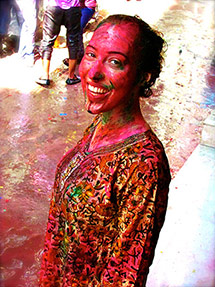
Hirsch: Though it may seem strange, I’d like to begin by writing about the importance of family in Indian culture. My program staff accepted me as their child the moment I walked off the plane, and my homestay family texts me that they miss me every day while I am on an excursion with my program. As many Indian parents do, my new “parents” (and there are about six of them) worry about me every time I travel and/or go somewhere new. This has been challenging for me to get used to. As an American, I value freedom and independence, which are principles that are not as important in Indian culture. However, I appreciate their concern with my safety and know that there is a reason why I am so protected.
While I have never felt seriously concerned for my safety, there have been numerous times that I have felt uncomfortable or nervous, especially when it is dark outside and there are no other women in sight. Safety is not only an issue for me as a foreigner; many of the Indian women around me stick to even stricter rules than I do about staying out late and being alone. I have found that I am less stared-at when wearing traditional Indian clothing, so I do this as much as possible. My “kurta” collection is growing quickly!
Hirsch: Sara, what is something you have learned during your travels in New Zealand before your program started that you wouldn’t have been able to learn in a class?
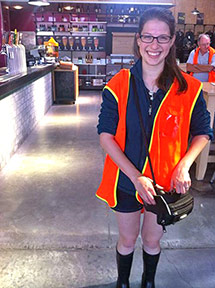
Fletcher: The pace, daily activities and mentality are very different between traveling and studying. I really appreciate my time traveling around the South Island before arriving in Auckland (the largest city in New Zealand located on the North Island) because it exposed me to a bit of the traveling culture. There are traveling standards that I became familiar with, such as omitting first names upon introduction and starting all conversations in English until another common language is discovered. This culture was really interesting to be a part of and not something that I had expected. There are also a lot of culture differences between the South Island and the North Island — namely, Auckland. Generally, life on the South Island is much slower, while Auckland, like most large metropolitan cities, is quite fast-paced. I think that experiencing the different lifestyles has helped me appreciate some of the culture differences within New Zealand, and I would not be as aware of them from simple discussions in a classroom setting. I also learned how to use a camping stove, which is a fun skill.
Fletcher: Maddie, you are on an art program studying in one of the most art-enthusiastic places in the world. Compared to Wash U/the U.S., what are the differences in how the general community and your professors perceive and relate to art? And do you think your relationship with art has changed during your time in Italy?
Wells: As a Renaissance city, Florence has this weird, almost automatic relationship to art. You don’t have to go into a museum to see it. It’s just there, everywhere — frescoes (wall paintings), mini-altars wedged into the sides of buildings, giant stone statues of David and, of course, the buildings themselves. It really does feel like you’re living in a museum sometimes. Except the art and architecture on display everywhere aren’t controversial; it’s such a tourist attraction that it’s practically Disneyfied. That kind of art historical context can be a little stifling or overwhelming because, as student artists, I think my peers and I are more interested in being relevant within a contemporary art context than in paying homage to Michelangelo Buonarroti. But when you remember how innovative and radical many of these Renaissance artists were for their time, you think, “Whoa, two-point perspective — that’s some pretty crazy stuff!” And then you shuffle back to your studio and just try and attempt to draw maybe one straight line (on a good day).
Wells: Sarah, I know how important social justice issues are to you at Wash U (and in life, generally), and I’m interested in how being in South Africa has affected or informed this passion?

Hull: Being in South Africa has definitely taught me a lot about social justice. First, South Africans view race really differently. Race is discussed really openly and people have different categories than we have in the U.S. The South African distinctions among “black, colored, Indian, white, etc.” are different from the lines Americans draw, which just highlights the fact that race is a social construct. And in South Africa, that social construct was set up by the apartheid government for the economic benefit of whites. That said, race is socially very real and has an extreme impact on the lived experience of South Africans.
I’ve also noticed the standards for resourcefulness and sustainability are much higher than we are used to in the U.S. Many things we think of as unlimited resources are really rationed here. There is no such thing as unlimited Internet, and scheduled power outages are common. Solar-powered water heaters are abundant, and laundry is pretty expensive. In my apartment, we’ve been doing laundry by hand. We in the U.S. could use a lesson in such moderation.
Finally, I’ve just really been learning from my South African peers about what we can do as young adults in this global world. I was at a meeting for a group called Equal Education, which is committed to improving education here. The meeting opened with apartheid protest songs sung in Xhosa. One person wore a T-shirt that said, “Every generation has its struggle,” with fists holding pencils, pens, calculators and paintbrushes. They were approaching the need for a better education system with the ferocity and passion with which they fought apartheid. I think we, as American students who consider ourselves “passionate about social justice,” have a lot to learn here about taking ourselves seriously and working toward real change in our world.
Reading all of your answers, I can’t wait to have a potluck or whatever when we get back and have this conversation face-to-face. I miss you all!
Wells: Yes, it’s going be a like seven-hour potluck.
